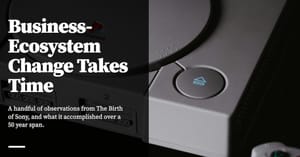This is the first part of The Principles Sequence — a series on Ray Dalio's Principles.
This is a blog about career moats. I’m not an expert at career moats yet. What gives me the right to write about this topic?
In order to tackle this question, I have to tell you two stories.
An accounting of weaknesses
The first story is about my move to Vietnam.
In 2013, I came back from an internship at Kicksend in Mountain View and started thinking about working in Asia. My decision was motivated by pragmatism as much as by fear: pragmatism because I had a 3 year bond to Singapore; fear because I'd been to about a dozen intern events in the Valley, and was painfully aware of the sheer amount of intelligence that I would have to compete with if I were to move there.
I remember taking stock of my abilities at the point. I was an average software engineer. I was a bad Computer Science student. I had to extend my undergraduate degree to 5 years instead of the usual 4, because I'd failed so many subjects. I knew I wasn't intelligent; I'd gotten into the National University of Singapore (NUS)'s CS cohort near the bottom of the class, and graduated near the bottom. Studying didn't come easy to me.
Here I need to pause, for the same reason my friends tell me that I shouldn’t talk like this whenever I invoke my weaknesses in front of them. I want to assure you that this is not a pity party: this is an accounting of weaknesses. It explains how I got to where I am today. I am writing this because it gives me skin in the game — if you think I'm lying, or talking out of my ass, I want you to be able to nail me with it. Giving you that ability means being honest with you; it means being transparent to the point of pain.
This accounting of weaknesses took place in my college lounge in Singapore. I remember that pretty clearly: I also took stock of my strengths. I'd gotten into NUS — one of the best universities in Asia — despite bad grades, because I'd written a blog called Novelr and later helped set up the Web Fiction Guide with an incredible guy named Chris Poirier when I was 18. Novelr was the blog on writing web fiction at the time; WFG is still the place you go when you're looking for serialised web fiction to read (thanks mostly to Chris, really).
I'd also inherited a club called LinuxNUS, transformed it into an org named NUS Hackers, and built it into the place you went to if you wanted to find NUS's best CS students. The Hackers still run Singapore's largest student hackathon today, and the succession process and culture we'd built still ensures the club's continued survival.
So: I could write, and I could build organisations. I needed to find a way to leverage my strengths to make up for my weaknesses. I knew there was no way I could build a successful career that depended on pure intelligence. I had to find an oblique path in order to do well in the tech industry; this meant building a set of skills that was rare and valuable that didn't pit me against pure intelligence.
Perhaps you've had similar experiences. If you haven't had some (oh you fortunate bastard you), then I'd like to tell you about a book called Principles.
Ray Dalio's Principles & Hyper-Realism
There's a book called Principles by Ray Dalio. I read it when I was a second year student in university, in a very dark period of my life: I'd just broken up with my first girlfriend, I'd failed 2 exams (MA1521 Calculus for Computing, and CS2100 Computer Organisation), and on top of that my first startup, Pandamian, looked like it was failing. I had just inherited the leadership of the NUS Hackers, and I felt very alone.
(Again, I'm writing this in a breezy tone, so you're probably reading this and thinking that it sounds all very nice and quaint, but I want to assure you I was really hurting at the time. My parents never went to university — my dad took a correspondence course, and my mum only had a diploma, and they were spending a lot of money sending me to Singapore. I'd only ever grown up in Kuching, a city of around 400,000 people on the island of Borneo. And so I felt horrible. Maybe you've never failed at school. And maybe you've never failed at life. But if you have, try and sort of simulate that dead feeling at the pit of your stomach, then you'd probably have an idea of how I felt at the time).
Dalio's book is not a very nice book to read when you're hurting. He believes in tough love; therefore his book is pretty much all tough love. But I'd like to ask you the same questions his book asked of me back then:
- What do you know is true?
- What are your goals? Or, alternatively: what do you want to achieve in life?
- What are you going to do to achieve 2) in light of 1)?
In my pain, my answers were stark:
- I knew I was failing math, that I wasn't able to do a startup, and that I was not fit to lead the NUS Hackers.
- I wanted to start a company in the near future. I wanted to start a family. I wanted to make a dent in a problem of global proportions before I died.
- Well, fuck.
Dalio's book argued that in order to succeed, you needed to start from an honest understanding of your reality. In more concrete terms: you needed to step outside yourself to understand your weaknesses. If while during this exercise you felt pain, then it probably meant that reality was trying to tell you something, because the problem is you; it is always you.
Perhaps you've felt this before. Think back over the past couple of months. Have you felt an immense amount of psychological pain at any point over this period? Or, perhaps more concretely: have you felt an unease in your gut, where you are actively avoiding thinking about something uncomfortable? Maybe you need to break up with your partner; you know it's not going to work out but you don't want to admit it. Maybe you have to quit your dead-end job, but the admission gives you a sick feeling. Maybe you have to deal with an abusive boss. Maybe, after having encountered a series of problematic bosses, you realise you are the common denominator in all these instances; maybe you realise YOU are the problem.
Dalio's argument is that these signals are an opportunity for growth. If you're avoiding the pain, then you're probably not owning up to the truth. And if you don't know the truth (1), then you aren't able to use (1) in order to achieve your goals (2) — whatever those goals may be.
My first career strategy
A few months after I returned to Singapore, I met up with Willis Wee of Tech In Asia (think: the TechCrunch of Asia). He said, almost as an offhand comment: “Why is South East Asia relevant? Well, if you're a big company looking to expand: where do you go to after China and India are taken? You go to SEA, of course. It's one of the most populous regions in the world. And it's not easy to dominate the region: each of the SEA countries are wildly different. So a company that has managed to successfully expand to each of the SEA countries becomes a very ripe target for acquisition.”
I thought about that analysis for a few weeks afterwards. I realised that Wee's argument made sense. More importantly, I realised that the second order implications were relevant for my career. If SEA mattered to startups because they needed to lock up markets across SEA, then they would need people who could set up and run offices in these diverse markets. This was a skillset I could learn.
More importantly, this was a skillset that was rare and valuable. I could not compete with my peers in NUS on algorithmic interviews. But I could compete against them with regard to setting up tech offices across 3rd world countries. This was due to three things:
First, not many of my peers were aware of Willis Wee's insight. It was only by luck (and my position with NUS Hackers) that I'd met Willis for coffee. I then spent some time working out the implications of his remark.
Second, I could compete with my peers because even if they did know of Wee's insight, they wouldn't be so willing to move to Vietnam. This discomfort was an edge I could wield.
Third, I could compete because this was not an easy skill to gain. In the end, I spent 3 years in Vietnam, learning to deal with government corruption, hiring strategy, technical management and organisational building in a foreign culture. It was great. And I now have a career moat for a few years — at least until I need to settle down.
Believability
In Principles, Dalio writes about how you should pay special attention to people who are ‘believable’ with regard to their subject matter. People are ‘believable’ when they:
- Have executed at least 3 successes in their specific field, and ...
- Are able to articulate exactly how they succeeded.
The metric works because a person who has not executed 3 successes in their specific field is a blowhard; you probably want to reduce the weightage of advice they give you on the topic. And they should be able to articulate how they succeeded because otherwise they just got lucky.
So what does this say about me? By this metric, I have created one career moat so far. And I'm still working on articulating how I was able to do so. I am not believable according to Dalio's metric.
What I am, however, is that I am determined. I believe I can become believable on this topic, and I aim to do so over the next decade. This belief is based on the necessity of the enterprise: again, I am not intelligent, and I need to compete based on my effectiveness, not my raw brainpower. My thoughtfulness about my career is the child of a long history of accounting for my weaknesses.
I think writing this would be valuable. Not many successful people are able to write about their Principles; yet success is more often than not determined by your decision-making abilities, not your general intelligence. If I am successful as a result of this exercise, then it would be a good record. If I fail; then I would have at least struggled well.
I've thought pretty deeply about how I should write this blog and how I can create the most value for the people who read me. Decision-making and career-planning is difficult to write about because it's context-dependent. Your circumstances and challenges, your skills and goals are very different from mine.
So there are two approaches I can take. The first is to write in an abstract manner, listing the mental models and principles that have worked for me, unmoored of specific circumstances. I disagree with this method. I believe it is ineffective at communicating how to use the models in your life. It is also too easy to write in this way from the perspective of a non-practitioner.
The other way is to be completely transparent about my struggle.
I think the latter is more valuable. I want to break down my decision making processes and work things out for myself — in the hopes that my experiences would help you in yours. My motivation is a real fear: I really am afraid of a future where my skills are rendered irrelevant. I have seen it happen to a few people already. I don't want it to happen to me.
Over the next few weeks, I'll summarise Principles by Ray Dalio, as well as blog a series of reflections as I reread the newer edition of the book. I'll also write about some basic principles I've been thinking about recently, that have evolved from my original reading of the book.
I welcome you to join me for the ride. Subscribe here, or follow the blog on RSS/Twitter. You're free to call me out as a blowhard any day of the week.
Next: part 2 — an overall book summary.
This is part 1 of the Principles Sequence. Subscribe here, or follow the blog on RSS/Twitter.
Originally published , last updated .





